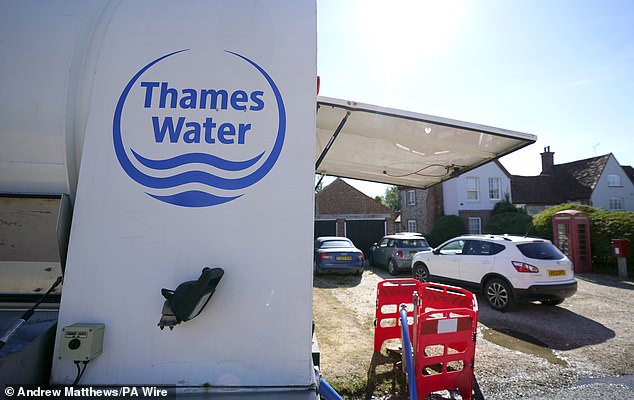[ad_1]
The timing couldn’t be better.
In the middle of an August heatwave, with drought warnings the order of the day, the message from the Government to Thames Water and its creditors is: sort yourself out or we put the whole caboodle into a special administration regime (SAR).
Environment Secretary Steve Reed has lined up City insolvency consultancy FTI as administrators should Thames chairman Adrian Montague and a posse of debt investors fail to reach a solution.
As much as one might abhor direct government involvement in business, SAR looks a far more attractive option than leaving the debt sharks in charge.
SAR would enable an administrator to scythe the debt, suspend interest payments and bring in new equity investors. Thames claims to be seeking a solution which targets ‘investment-grade ratings’.
That is no more than a chimera in that the company would not qualify for a licence without.
How much room does Reed have to manoeuvre? Keir Starmer is already taking the railways and chunks of the steel industry onto the Government books.
He may soon also face calls from union paymasters to bail-out the UK’s troubled Ineos-owned chemical plant at Grangemouth.

As much as one might abhor direct government involvement in business, SAR looks a far more attractive option than leaving the debt sharks in charge.
Administration would allow Thames to free itself of much of its £16.8billion debt.
But there would be a risk of a lingering state liability. That is the stuff of nightmares for Rachel Reeves and Treasury mandarins.
Jobs tears
Chancellor’s budget for working people has already fallen as flat as a pancake. The latest data on the jobs market is a shade better than projected.
But the trend is unmistakable with unemployment up 120,000 since last July’s election Surveys show that the Government failed to truly grasp the impact of increasing employers’ National Insurance Contributions and the minimum wage on jobs, particularly in the hospitality sector.
Yet there is a pile of evidence, particularly from the US, showing that payroll taxes harm employment growth. Cutting job taxes, particularly after a calamity, helps nurse people back to work.
The big economic theme of this summer, despite the Chancellor’s promises not to come back for more, is speculation as to which taxes will go up in the autumn.
Labour apparatchiks have sought to dismiss the forecast by economic think-tank NIESR of a £42billion shortfall in the public finances as an outlier.
However, almost every other think-tank and City economist believes that new taxes will be necessary if the Chancellor’s ‘iron-clad’ fiscal rules are to be met.
That casts a pall over economic confidence. It doesn’t help that the UK’s biggest export market, the EU, is deep in gloom despite aggressive interest rate cuts by the European Central Bank.
A plus for the Government at present is that wage settlements are outpacing inflation so real living standards, for those in work, should be rising.
That’s great, but job vacancies are vanishing before our eyes and somehow private sector employers need to fund the 4.8 per cent rise in pay, which means a potential wage price spiral.
That’s before one even considers the Government’s difficulty in seeing off the ambitions of doctors and other public sector workers for inflation-busting deals.
A split Bank of England interest rate setting committee is torn between its core job of returning inflation to target and making life easier for borrowers.
The latest jobs data will give succour to Bank insiders cautioning against cuts until consumer price inflation is squeezed back to the 2 per cent target.
Third rate deal
On the eve of tomorrow’s extraordinary general meeting of London listed fund Third Point Investors Limited (TPIL), voting advisory outfit PIRC joined the growing opposition to financier Dan Loeb’s raid on UK-based investors.
The New York sharpshooter is seeking to seize control of TPIL, swallow £500million of capital and merge it with Cayman Island based re-insurance outfit Malibu.
The transaction would run roughshod over minority investors and enrich directors. It represents a low point for a City in danger of sacrificing integrity.
DIY INVESTING PLATFORMS

AJ Bell

AJ Bell
Easy investing and ready-made portfolios

Hargreaves Lansdown

Hargreaves Lansdown
Free fund dealing and investment ideas

interactive investor

interactive investor
Flat-fee investing from £4.99 per month

InvestEngine

InvestEngine
Account and trading fee-free ETF investing
Trading 212
Trading 212
Free share dealing and no account fee
Affiliate links: If you take out a product This is Money may earn a commission. These deals are chosen by our editorial team, as we think they are worth highlighting. This does not affect our editorial independence.
[ad_2]
This article was originally published by a www.dailymail.co.uk . Read the Original article here. .

